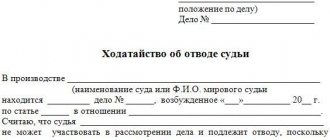Home / Complaints, courts, consumer rights
Back
Published: 10/05/2018
Reading time: 7 min
0
621
In almost every work collective there are employees who perform their duties in bad faith. This can lead to an unfair redistribution of responsibilities between other workers, who have to work harder and take on the responsibilities of a colleague.
- Complaint against an employee: grounds
- Procedure for filing a complaint against an employee
- Filing a complaint against an employee and its structure
- Where to file a complaint against an employee
- Ways to file a complaint
- Time limits for consideration of a complaint
In such a situation, a good way out would be to file a complaint against the employee with a demand to take action and eliminate the violation of labor discipline.
What behavior in the workplace is considered unlawful?
The rules of conduct for an employee at an enterprise with colleagues, management, clients and partners must be defined in local regulations, as well as in the rules of business communication.
The Labor Code stipulates that any employee must communicate taking into account professional, corporate, and social norms.
Each employee must be familiarized with the adopted regulations upon signature. Thanks to this, he will have clear criteria by which his behavior will be assessed as unlawful.
Insult
This offense is expressed in the employee’s unlawful actions towards a third party, which led to the humiliation of his honor and dignity.
The use of obscene language, comparing an opponent with some animate or inanimate object, etc. can be considered an insult.
Very often, insults can be found between colleagues, as well as among superiors towards their subordinates.
Boorish behavior
Rudeness involves rude, insolent behavior or statements made by an employee. Most often, rudeness affects everyone around and is not directed at any person.
Usually, rudeness acts as an expression of the employee’s superiority over the people around him. Often this behavior can be found among colleagues who hide their incompetence.
Refusal to perform assigned duties
When signing an employment agreement between an employee and the administration, he undertakes to fulfill the duties assigned to him by this document. But sometimes a situation arises when an employee refuses to perform these duties.
This right is given to him by labor legislation, but only in situations where the administration does not fulfill its obligations to pay wages, or for other valid reasons.
Attention! In other situations, refusal to perform duties for an employee will be a serious disciplinary offense that may have consequences for him.
Manipulation in relationships

Manipulation can be observed not only between colleagues, but also between superiors and subordinates. Sometimes the fact of manipulation is very difficult to determine.
However, if the second, injured party detects the presence of manipulation, it can complain about this to higher authorities.
Attention! It is quite difficult to prove manipulation; in addition, this offense cannot be qualified as a disciplinary violation. Here, only public censure can be used to combat it.
Classification of memos
If we consider this type of official documentation from different positions, we can identify several of the most frequently used types of reports.
- Content. Depending on what information the report contains, we can distinguish:
- informing - conveying to the authorities the information necessary for making a decision, for example, about the progress of work, about the nuances that have arisen, and methods of action; as a rule, submitted regularly until the completion of the project;
- reporting – reports on the completion of any stage of work to receive further instructions and, if necessary, normalize the situation;
- proactive - the author makes his proposals based on the information he provides.
- Destination. Its type depends on who exactly the report is sent to:
- external - sent to the management of another institution;
- internal – addressed to higher-ups within the organization.
- Data. Information brought to the attention of management that requires immediate action is often negative. But it happens that you need to notify your superiors about the employee’s special successes. The type of report depends on the situation described in it:
- violation of labor regulations and discipline;
- failure to perform or insufficient performance of official duties;
- allowing insults to honor and dignity, unacceptable behavior, provoking conflicts;
- outstanding achievements worthy of awards, etc.
FOR YOUR INFORMATION! Internal and external reports are characterized by a significant difference in design: for the latter, the organization’s form is required.
Drawing up and filing a claim
In order to convey the fact of the incident to management, the victim must write a claim. It can come from both other employees and clients of the organization.
Types of complaints
Let's look at what types of complaints exist.
Individual
If a complaint against an employee is filed by one person - a colleague or a visitor, it will be considered individual.
The document must necessarily contain the applicant’s personal data, otherwise it may not be considered. This type of complaint is most often encountered in practice.
Collective
If the employee’s behavior affected the whole team, then all offended citizens can make a single collective complaint.
How to write a collective complaint: sample
- “cap” indicating the addressee’s details and communication methods (telephone, email, postal address);
- an introduction revealing the connection of the persons filing the complaint with the violator and the reason for the appeal;
- the main part - list the facts of violations with evidence and links to legislation;
- in conclusion, put forward your demands, requests; in particular, that the situation be analyzed, assessed properly, and the violated rights restored.
- you need to communicate with the other participants, find out their opinion on the problematic issue and try to come to a consensus, a common opinion;
- Before making a collective complaint, be sure to write down the contact information of all participants so that if necessary you can contact them;
- it doesn’t make sense to write a complaint collectively in the literal sense, let one person do it, but at the same time objectively reflect all the significant circumstances and facts, the rest of the participants will read it and sign or make certain adjustments;
- in the text of the complaint, adhere to the use of the pronouns “we”, “us”, i.e. in plural;
- We recommend that all claims be stated on the merits, with as little emotion and as much facts as possible, references to legislation are welcome; do not pour water, voluminous text is not always good;
- Finally, put forward your demands;
- a mandatory attachment to the complaint is a sheet of signatures of all interested parties;
- Be sure to include contact information; if there are many participants, it is better to indicate only one – a representative.
Where to file a complaint
Complaint to management
The first step is to file a complaint against the employee to his superior manager. Such a document must be submitted through a secretary, and it must have an incoming registration number. Upon receipt of a written request, the applicant must give a written response.
In the submitted appeal, you must write in detail about the facts of the employee’s boorish behavior. However, when drawing up a document, it is imperative to follow the rules of business correspondence. When submitting an appeal to the manager, the text cannot indicate exactly how he should deal with the violator.
Labour Inspectorate
If boorish behavior at an enterprise comes from the manager, then you can file a complaint against him with the labor inspectorate. Upon request, an inspection must be carried out to establish facts of violation of the current legislation of Russia.
When submitting an appeal to a government agency, it is very important to provide evidence of such behavior, since it is unlikely that the manager will behave this way with inspectors.
Therefore, they can be used:
- Audio and video recording;
- Written testimony of eyewitnesses to the violation.
The consequence of contacting the labor inspectorate may be the imposition of a fine on the violator.
Prosecutor's office
If the labor inspectorate was unable to resolve the conflict, you can file a complaint with the prosecutor's office. Based on the results of the investigation, the perpetrator may be held accountable.
However, even in this situation, the author of the appeal must provide complete, indisputable evidence of boorish behavior towards him.
Class action
A situation may arise when an employee’s inappropriate behavior affects several people at once. In this case, they can file a complaint collectively.
Such a complaint can also be filed with the judicial authorities. Moreover, in this situation, you can receive various compensations through the court, not only provided by law, but also for moral damage.
Important! It is also necessary to take into account this point - evidence of the defendant’s guilt must be provided by the plaintiff. If the case in question involves boorish behavior, it is advisable for the plaintiff to have audio and video evidence of the incident.
Ways to file a complaint
A complaint is sent by a group of people to the appropriate organization in one of several ways:

- They personally send the complaint to the organization (for example, through the secretariat) - in this case, they must receive a receipt for the document or a certified copy with a mark of acceptance.
- They send documents by registered mail with acknowledgment of delivery and a list of attachments . This method is suitable for cases where the management of the organization refuses to accept the complaint.
- They submit a complaint with the help of their representative , in whose favor a power of attorney is issued.
- They submit a complaint via email or feedback form.
Acceptable time limits for responding to a complaint
When determining the period within which an enterprise must respond to a complaint received, it matters from whom it came.
If it comes from a government agency, then a response must be drawn up within thirty days. When a response letter requires additional information from third parties, this period may be extended by an additional thirty days.
Attention! When the response period is not defined by the standards, each company can determine its own period within reasonable limits in its regulations. For example, when writing a complaint, its authors often ask for an answer within 7-10 days.
How and where to file a collective complaint against a manager
In a situation where the director manages the business individually, and is also the owner, there is nothing left to do but take the long route. You can start with the labor inspectorate of Rostrud in your region. If the result of her inspection did not satisfy all members of the team, then you can continue the fight and write a collective complaint against the manager to the prosecutor’s office.
We recommend reading: Recognition of Property Rights Due to Acquisitive Prescription
It may happen that the prosecutor's investigation did not complete the case. At this point, the stage of writing collective complaints ends, because workers have only one path left - to the court, and here only personalized claims against the actions of the boss are accepted from each applicant separately. The only thing the court can do is to consolidate the consideration of these claims based on similar circumstances.
What penalties can be applied?

Also, an economic entity has the right to establish measures of influence on an employee for a disciplinary offense. The main requirement is that the company employees be familiarized with the acts that established them, upon signature.
Articles 192 and 193 of the Labor Code of the Russian Federation establish a strict list of penalties that an employer can apply to its employees:
- Announcements are made verbally.
- Issuance of a reprimand by order of management.
- Termination of an employment contract with an employee.
In order to apply disciplinary measures correctly, it is necessary to comply with established procedures, including the presentation by the employee of the company of an explanatory note in which he explains what happened.
If an employee refuses it, this does not mean that the employer cannot fire him for this.
It is also important to consider the period when an employee can be held accountable. By law, this time is limited to one month. The employer must remember that the same violation cannot be punished twice.
It is imperative to take into account that bonuses are awarded for compliance with certain established criteria.
If they are violated, then bonuses will not be paid. This is not a disciplinary punishment, but is considered a material consequence of the current situation.
The main thing is that the criteria by which bonuses are accrued or not accrued are recorded in the appropriate regulations and employees are familiarized with this act upon signature.
Collective complaint against the boss: sample document for review
Such processes have a negative impact on the organization’s reputation. Therefore, it will only be more profitable for senior management to remove such a managerial employee from performing his duties if he does not know how to behave appropriately with subordinates.
The employment contract outlines all the rights of employees, and these issues are also considered in the Labor Code of the Russian Federation. When such rights are violated by a manager, there is a violation of certain provisions of the employment agreement, which is considered a valid reason for filing a collective grievance.
Consequences of writing a collective statement
What exactly will happen to the violator depends on where the complaint was filed and on what interests of the workers were affected. If the complaint was submitted to higher management, the culprit will be subject to disciplinary action or a fine.
If you contact the labor inspectorate, based on the results of the inspection, the director of the enterprise is sent an order to eliminate the problem, the organization and its boss receive a fine.
The prosecutor's inspection entails not only administrative, but also criminal liability.
Do not forget that groundless complaints against the employer do not lead to the result expected by the applicants and turn against them, since they are slander.
No rating yet









